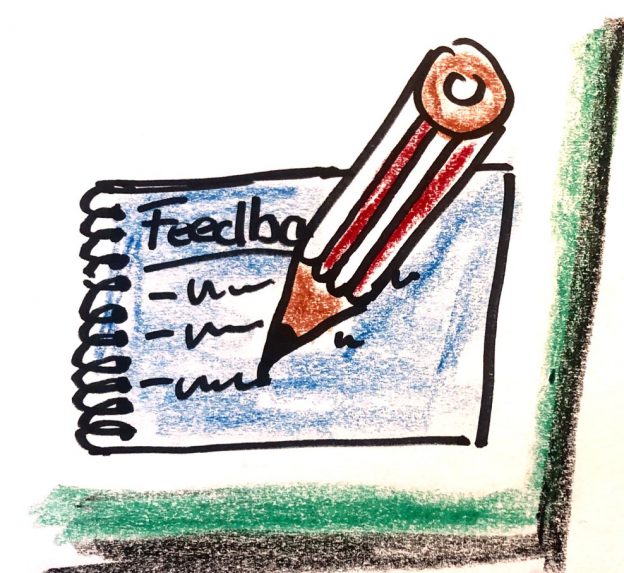
… so that feedback becomes more accurate
Helpful feedback is based on precise observations. General feedback is of little help. I need my pad and pen to take notes while observing. This is the only way to make my feedback accurate. Digital natives probably do this with tablets or suchlike.
I find mind maps helpful
Before a short presentation exercise on which I am to give feedback, I create a mind map. The main branches depend on the learning objectives of the respective exercise unit. Sometimes I additionally ask: „What should I pay special attention to in your case?“ I use mind maps because I can jump around and add things. But any other form works, too; the important thing is that observations are captured.
When do I write?
In longer sessions, I already write during the „performance“, but I also need a few minutes afterwards to complete and prepare the oral feedback. If a presentation is very short (5 minutes), I only grab my pen after the presentation so as not to unsettle the participants.
Notes during peer feedback
I like to encourage participants who are to give peer feedback to write down their observations. How does this work? The easiest way is for the trainer to demonstrate without comment. There are also feedback methods such as the „one-minute paper“: everyone writes their feedback briefly on a piece of paper after the exercise, which is then handed over.
With feedback on cards, which are then collected on a pin board like a card query, everyone writes. Feedback on cards becomes more accurate when not everyone observes everything, but only specific areas. Someone focuses on eye contact, someone else on the structure/the thread or on audience activation.
Taking notes during the final feedback session
During feedback rounds at the end of a seminar, I write down the feedback for myself as a trainer. I try to classify the participants‘ statements into the two categories „keep“ and „change“. When I teach the seminar again, this transcript of the final feedback is the starting point for the new lesson plan.
Author: Ulli Lipp
Translation: Astrid Donaubauer

Dieses Werk ist lizenziert unter einer Creative Commons Namensnennung-NichtKommerziell-Weitergabe unter gleichen Bedingungen unter gleichen Bedingungen 3.0 Österreich Lizenz.
Volltext der Lizenz

